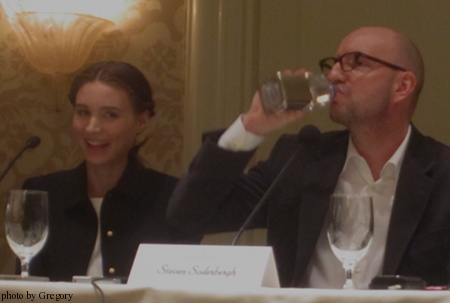
Steven Soderbergh's new movie Side Effects is about drugs, and reality, and how subjective "reality" may become. It features Jude Law as a hip New York-based psychiatrist, Rooney Mara as his troubled charge, and Catherine Zeta-Jones (in her third Soderbergh production) as a doctor with mysterious intentions. It's a bit sexy and a lot twisty.
I spoke with Side Effects screenwriter Scott Z. Burns (Contagion) and co-producer/technical adviser Dr. Sasha Bardey (Wonderland) in tandem. Starting off, I asked how a writer takes a controversial subject (behavior-altering medications) and applies it to a thriller paradigm, with a trained doctor overseeing, to keep the characters' motivations plausible.

Dr. Sasha Bardey (left) and Scott Z. Burns
"Kind of the way you just described it," laughs Mr. Burns, who counts Double Indemnity, Body Heat and The Usual Suspects among his favorite scripts. "I think that, as a writer, there are worlds that you instinctively feel are going to be fruitful for providing you with stories. I had had this amazing privilege of going to Bellevue with Sasha for a while, and learning about different cases, the intersection of psychiatry and the law."
"And it would bounce to my side," adds Dr. Bardey, "and we would talk, and it would get tweaked so that it stayed within the realm of the legitimate. It's really about understanding the world (of psychiatry) from the inside, and using that knowledge to create plot-points, and twists."
Of the film's inscrutable lead, Mr. Burns says:
"Rooney was great. There were people we knew who had suffered depression, who were generous enough to sit down and talk to her. I found a couple of amazing clips on YouTube of people who were really depressed, who had created video logs to talk about their depression, and I'd send those to her. She really did her homework, as did Jude."
Dr. Bardey explains: "Jude spent a lot of time in my office, meeting with me, meeting with my colleagues. He zeroed in on the issue of boundaries -- how much this movie hinges on pushing and breaking certain boundaries. I think it's reflected in his performance."

Rooney Mara and Steven Soderbergh at the Side Effects press conference
I bring up those relentless television commercials for drugs, with the lengthy disclaimers in "sped-up speech" -- and ask how one bases a film in that milieu.
"I think we start in a slightly different place," responds Mr. Burns, "but it informs the place you're talking about. We start from a place of: 'What's gonna make the coolest ride? What's gonna make the most interesting mind-fuck? -- for lack of a better word." (We ponder a moment on whether this clinical term will be printable.) "For me, I think the coolest rides are rides through landscapes that you think you know. So when you're watching the movie, you go: 'Oh yeah, I was depressed' or 'I knew someone who was depressed' or 'I knew someone who was on that pill, and yeah, they did have a problem with it.'"
"So to me, as a writer, it was less about choosing those things from any sort of social-commentary standpoint, and more about building a landscape that the audience would feel comfortable in."
"Psychologically," responds Dr. Bardey, "that's the hook to get people to get on that ride. Everyone's been touched by something that they'll see in this movie, and that's their buy-in."
"And it does open up lots of interesting head-fakes," continues Mr. Burns, "because there's stuff about these things that, as a society, we do wrestle with. Even that is part of a familiar landscape: We hear conversations about, 'Are these things overprescribed?' If you go to your computer and Google 'murder cases' and 'implications of drugs,' you'll find tons of cases where someone was on some sort of prescribed medication, and something happened that was not intended. To me, when you have millions of people, it starts to turn into monkeys typing Shakespeare: if you're giving millions and millions of people a drug -- "
" -- something's going to happen," concludes Dr. Bardey. "Because it's a law of numbers. Even if that side effect is exceedingly rare -- one-tenth of one percent -- if millions of people are on it, you do the math, it's gonna happen. Not a lot, but enough to creep into people's consciousness, and then make this believable."
Without revealing plot, I ask about prescription medications which may induce sleepwalking -- in particular what behaviors might be acceptable in that condition which may not be while awake.
"Well, anything you do in a sleepwalking state," answers Dr. Bardey, "has the potential to be outside that person's control. If you're functioning in a sleepwalking state, your frontal lobe -- the part of you that is observing what's going on, that's critically looking at yourself -- is gone. So you're functioning much more on an instinctual level, driven by some very basic desires. So you will eat, you will 'sext' messages, you will call your ex-boyfriend -- you will do all those things in that state, because there is no-one at the wheel anymore. No-one's got their foot on the brake."
Mr. Burns elaborates: "There are really elaborate things, in doing the research, that I found out people do. People sleepwalk and drive to work! They wake up and they have no idea how they got there."
Dr. Bardey adds a thread:
"Which then raises tremendously interesting legal issues. What's the degree of culpability of someone who commits an act in that kind of state? Because, the way we look at things, it's intentional behavior: driving a car is complicated; killing someone is complicated: you have to engage in serially purposeful behavior -- but if there's no observing part of you, are you guilty? Are you responsible? That's a fascinating question."
"And it was at that point in this conversation, seven or eight years ago, that the movie was born," divulges Mr. Burns. "Because all of a sudden I was like, 'Wow. That's a problem.' The last thirty seconds of someone talking really fast in a pharmaceutical commercial, to me as a screenwriter, it's like a big flag waving at me, saying, 'Come here!''

Jude Law and Catherine Zeta-Jones
I ask both men if there's a common occurrence of any sort of behavior-altering drug pushing anyone over a moral limit.
"Alcohol," says Mr. Burns.
But what about murder?
"Alcohol," repeats Mr. Burns with a bit of a laugh. (Suddenly I feel like discussing Nick Cave songs. But I don't.)
Dr. Bardey elaborates:
"Any medication that has a sedative effect is going to quiet down parts of your brain. And depending on which part of your brain gets quieted down, you're either asleep, or you're acting, potentially, in a dangerous way that's out of control. There's a number of those kinds of medications, and those are potential side effects."
A veteran film critic, I ask about a plot-point in Side Effects that made me go, "No way." Both men respond that they've observed the same action at Bellevue, in reality. Whoa! Just doin' my job.
Mr. Burns sums up:
"There are people with little amber bottles in their purses, and everybody's taking something to try to get better -- and against that background, do we really know anybody's internal state anymore? You learn, early on, the power of manipulation. And now we're created a huge amount of camouflage, in terms of pharmacology."
Side Effects opens this Friday.